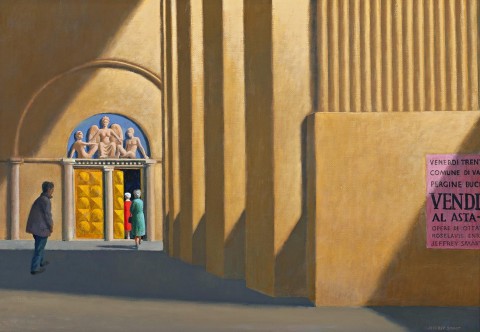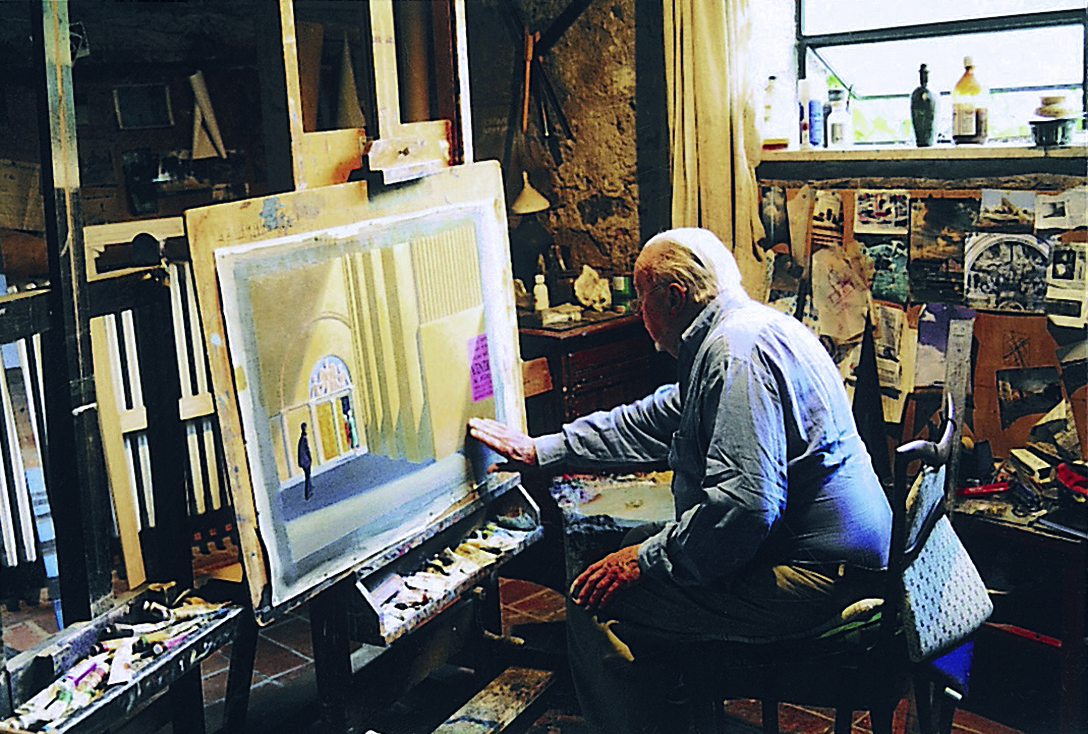HEAD OFFICE, 2002 – 03
JEFFREY SMART
oil on canvas
56.0 x 80.5 cm
signed lower right: JEFFREY SMART
Australian Galleries, Sydney (label attached verso)
Private collection, Sydney, acquired from the above on 18 October 2003
Jeffrey Smart Painting and Studies 2002 – 2003, Australian Galleries, Sydney, 23 September – 18 October 2003, cat. 25
Grishin, S., Jeffrey Smart: Paintings and Studies 2002 – 2003, Australian Galleries, Sydney, 2003, pp. 13, 39 (illus.), 50 (illus.), 51
Study for Head Office, 2002, oil on canvas, 38.0 x 54.0 cm
Figure Drawing for ‘Head Office’, 2002, pencil on paper, 22.0 x 14.0 cm
Drawing for ‘Head Office’, 2002, blue ink on paper
Jeffrey Smart’s paintings delight the eye with their immaculate order and tantalise the mind through tempting clues. Wrapped in the sensuous beauty of his colour and light, their sense of actuality is as powerful as it is artificial. In Head Office, 2002 – 03 subjects are again drawn from the modern urban world, dehumanised, then enlivened by ambiguity and irony. A master of the enigmatic, he claims the completion of the picture as his role, leaving it to the viewer to interpret if so inclined.1 For Head Office, refinement of composition can be traced through three studies, while the evolution of meaning is found in clues that equally lead astray. Within the balanced verticals and horizontals fall the shadows of diagonals. One recalls Smart’s liking for T. S. Eliot.
Between the idea
And the reality
Between the motion
And the act
Falls the shadow.
- T. S. Eliot, The Hollow Men, 1925
The fallen shadow is central to the frozen mobility of the echoing harmony of angles and immobile figures. And a brilliant note of red, the woman’s dress, is chosen once again as the focal point. Poised in the doorway, she is about to step into a darkness of uncertainty, adding to the pervasive air of expectancy, the hallmark of the best of Smart’s art.
The evolution of Head Office from the first composition drawn in blue ink, through the study in oil (both of 2002), to the pencil drawing of the figure of the man of 2003, is fascinating in its pursuit of resolution.2 In the preliminary ink drawing, what lights do the inscriptions ‘Head Office’ and ‘Credits’, with the figure of an armed soldier outside, throw on the delicious ambiguities of the final painting? In the oil study, does the tympanum with its classical figures, suggestive of an angel with arms outstretched to Adam and Eve (everyman), introduce religious connections with allied notions of power? Even the ever- solid doors of security and geometric patterns play with concepts of hard-edged and colour field painting. (As a figurative artist, Smart was very aware of modern movements, comments on which often found their way into his paintings.) And is a pun at work in the alignment of church entrance and head office? Smart plays with incongruity like a toy, and meaning is as ubiquitous and ephemeral as light. Yet, as Sasha Grishin has observed, Smart has ‘… an obsession with the physical and metaphysical effects of light…’.3
This is further compounded by the pink poster to the right, Italian words truncated to celebrate other uncertainties. Translated, the words ‘Friday’, ‘Municipality of V[aldarno?]’ and ‘Jeffrey Smart’ may be clear; but is an auction sale to take place? And may ‘Roselavie Enr…’ be an anagram of the song ‘La Vie En Rose’, popularised by Edith Piaf? Or again, of ‘Rose Sélavy’ a pseudonym used by Marcel Duchamp, who challenged the very notion of art? Within the super clarity of composition, there remains a likely random jumble, temptingly suggestive without clear meaning. Colour, light and composition are his subject. Whatever we may find in Head Office, there is great pleasure in looking. Moreover, in a world in which noise is the greatest pollution, Smart’s silence is empowering.
1. Grishin, S., ‘Jeffrey Smart’s Eternal Order of Light and Balance’, Jeffrey Smart Paintings and Studies 2002 – 2003, exhibition catalogue, Australian Galleries, Melbourne, 2003, p. 8
2. All four works are illustrated in the above-mentioned catalogue, pp. 36 – 39
3. Grishin, S., op. cit., p. 8
DAVID THOMAS

